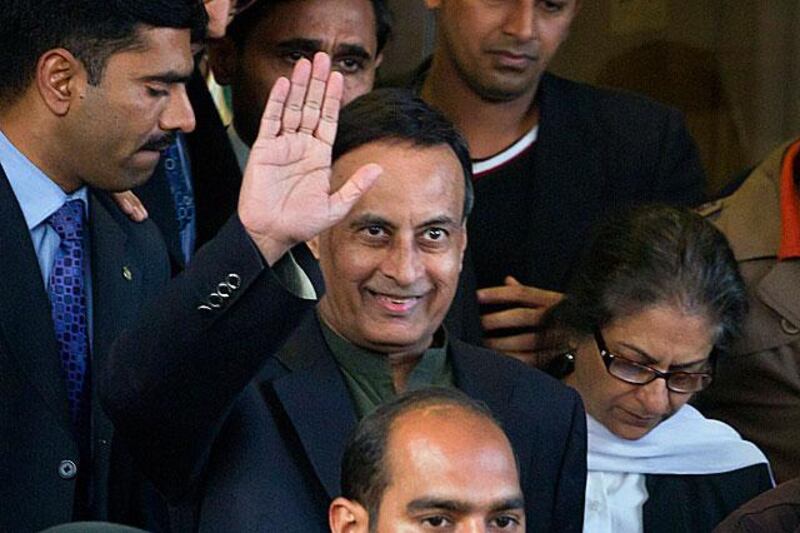ISLAMABAD // Pakistan's prime minister, Yusuf Raza Gilani, said yesterday there was a conspiracy to overthrow the country's civilian government - the latest sign of a growing rift with the powerful military.
His comments come amid a scandal that threatens the president over a memo allegedly from Islamabad's ambassador to Washington asking for US help to avoid a supposed coup by the army after the American raid that killed Osama bin Laden in a Pakistani military town.
Just days ago, Mr Gilani insisted there was no rift with the military.
The Supreme Court is investigating the memo scandal and has demanded answers from President Asif Ali Zardari.
Leaders of Mr Gilani's Pakistan People's Party blame the military, which has ruled Pakistan for more than half its 64-year existence, for stirring up the memo controversy to find an excuse to overthrow the government.
Mr Gilani echoed these fears yesterday in comments broadcast live on state television while addressing a function in Islamabad.
"Conspiracies are being hatched to pack up an elected government," he said. "We will continue to fight for the rights of people whether we stay in government or not."
Later, Mr Gilani told parliament the military insisted it was not accountable to the civilian rule, adding this was "unacceptable".
"There can't be a state within a state ... it can't happen in a democracy," he said.
On Wednesday, the government wrote to the Supreme Court saying it had no control over the military or its main spy agency, Inter-Services Intelligence.
Tensions have been rising between the government and the military over the memo delivered to the US military chief by a Pakistani-American businessman, Mansoor Ijaz, allegedly on the instructions of the then-ambassador to the US, Husain Haqqani.
Mr Ijaz said Mr Haqqani was acting at the behest of Mr Zardari, who has had uneasy ties with the army since his government came into power in 2008.
The unsigned memo sought US intervention to head-off a possible military coup after US special forces killed bin Laden in a secret raid in Abbottabad in May.
Mr Zardari and Mr Haqqani deny any wrongdoing, although Mr Haqqani was forced to quit, reportedly after the army put pressure on the government.
Speculation Mr Zardari could also be forced to step down mounted when he suddenly left for Dubai this month for medical treatment. The embattled president returned at the weekend, but doubts over his future remain.
The government has described the memo scandal as a conspiracy to harm civilian rule and wanted a parliamentary panel to investigate.
But the military chief, General Ashfaq Kayani, arguably the most powerful man in Pakistan, has called the memo a threat to national security and an attempt to demoralise the army.
Pakistan's army was humiliated by the US raid to kill bin Laden because it was not told in advance.
After that raid, the military faced unprecedented criticism and questions at home about how it was possible for the world's most wanted man to live just a few kilometres away from the military's main academy unnoticed for about five years.
Some military analysts have even speculated the house he lived in was an army safe house.
The US has become increasingly vocal in its criticism of Pakistan's failure to deal with the Taliban and other militants fighting in Afghanistan.
In a sign of the deepening row with the army, Mr Gilani said questions were being asked about why the government gave hundreds of visas to Americans which many Pakistanis believe enabled the CIA to boost its clandestine hunt for bin Laden.
"But the real question is on which visa he [bin Laden] was staying here ... now they are diverting [blame] to the civilian government," he said in parliament.
Mr Gilani said the government stood by the military.
"We never belittled their image ... but there cannot be a state within a state," he said.
Pakistan has had a long history of tension between the army and political leaders. Many Pakistanis view their political leadership as inept and corrupt.
The government is increasingly under fire over its close relationship with the United States. Many Pakistanis are angry at the number of US drone strikes inside Pakistan, and the consequent civilian deaths.
The country's most populous province, Punjab, has stopped accepting US aid in protest over the bin Laden raid.
Relations have worsened since a Nato airstrike last month that killed 24 Pakistani soldiers at two posts on the border with Afghanistan.
A US military investigation found yesterday that both American and Pakistani forces were to blame for the incident.
"Inadequate coordination by US and Pakistani military officers operating through the border coordination center - including our reliance on incorrect mapping information shared with the Pakistani liaison officer - resulted in a misunderstanding about the true location of Pakistani military units," the Pentagon said in a statement.
The strike prompted Pakistan to block all Nato supplies to Afghanistan and throw the US out of a Pakistani airbase used to operate drones.
Most of the supplies for the Nato-led International Assitance Force in Afghanistan come through Pakistan.
The US president, Barack Obama, has called Mr Zardari to offer his condolence. But the US has stopped short of an apology over the deaths.
foreign.desk@thenational.ae
With additional reporting by Reuters





